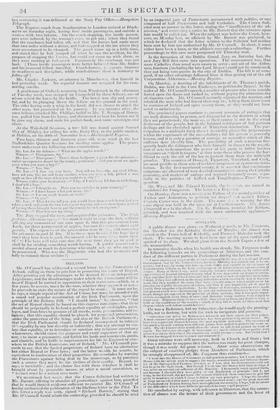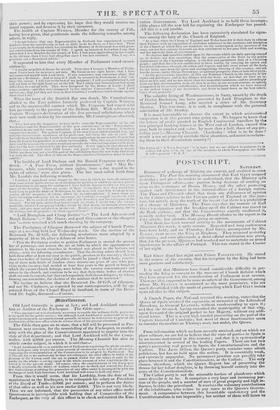N U.
A public dinner was given, On Wednesday week, to Air. Ferguson, the Member for the Kirkahly district of Burghs : the (limier was served in the Town-hall of Kirk:tidy, and Provost Malcolm took the chair. meeting seems to have heen one of the most cordial and spirited of its class. We shall glean from the Scotch l'apers a few of the memorabilia. In returning thanks when his health was drunk, Air. Ferguson made the following rennet ks on the proceeditigs of Alinisters, and the con- duct of the different parties in l'arliament doing the last session.
" I must express nly regret at the ob. lades t lima-rill. the war of a anal literal Government—out by the Conservative,. for their brill flit y was witural and 10 hi• ex- ported ; but I say, by many 5%110 1141 up iti IIi.• to -lame uC Carliamentary !felon'', as the basis a IA means of all lot tire refUrMS anal coriert ion of Abuses. Many of these. I say, :10,4 toaards Govcrum.•ot, by rather rash expectations or hurried attempts to carry mien it was inapo.sible all at once to attain. They said that little had lama done, and that gr,•at al-al more should lime been attune. I think. it' they had reflected ou the many difficulties which stood in 111, way of Gm ern• meld, that they would at the same time have seen the damer elikla might oceor by pressing too rapidly the progress of tedium. and that it was impossible ail at owe to gratify their sang • expectations. In the Manse of Commons, motions mete made and pressed which were embarrassing to, and did embarrass Mita:Ayes ; becmse they Hamad, thought not opposed to the prirciple of these !notions, that it was quite impos- sible to 411.COMptiSil every thing at once and then:fore many matters were obliged to stand trier. Alinisters claim to have a little time given to there, and desire to have a little of the confidence of the country ; which, if they tail to merit, let theta minuet that disgrace which such failure %%mild desei ve."
He was a Reformer, but no Suhverter—he would apply the pruning- knife, not to destroy, but with the wish to invigorate and preserve.
'• Subverters can Dever be Reformers; reform is not their object nor their policy. A most extraordinary political phenomenor. has been produced by recent events. We have seen a jaunt ion formed between the most repellant materials. The eMfeMCS of two parties, el gh coming from dint-writ points, have united to produce the same re- sults. The of l Conservative would allow the iatirie to fall to the ground fur want of repair. l'he Subverter attempts to unfe:UmW it ; and if either of these parties were aitowed to attain their object, the eons' it at. ion would became a ruin. But thank God Reform has stepped forwani to renew and renovate it
Great reforms were still necessary, both in Church and State ; but it was a mistake to suppose that the nation was ready for great changes, though it was ready for great reforms. After some observations on the subject of exacting pledges from Members of Parliament, which he strongly disapproved of, Mr. Ferguson thus continued-
" I went into the House of Commons an independent member ; but I wept into that House with the ardent wish to support the manly, constitutional, anal virtuous charac- ter of the distiuguislusl Premier, Sain,liVel, as 1 was, that his Government could not fail to go in ilia right track. But though I went into the House with these feelinos, I was never an out-a Mout adherent of the Ministry. I frequently voted against dom. Hot because I thought they were guilty of any dereliction of principle : but I, not being in the Cabinet, did nut know the reasons Which led them sometimes to give the go-by to measures on which I chose to follow my own principles. I hope the country at Inrge are saiisfied that much and great g00(1 hens twin' done; and the great measure of Pailiamentary Reform having been accomplished, the country, 1 hope, will be aware of the diftieulties which have hitherto pr.veuterl its more rapid progress."
He concluded by saying, with reference to:%linisters, that the correc- tion of abuses was the tenure of their government and the lease of
their power; and by expressing his hope that they would receive na- tional support, and deserve it by their measures. The health of Captain Wemyss, Member for the county of Fife, having been given, that gentleman made the following remarks, among others, in reply.
" I do not believe that any Representative in Scotland has experienced so notch kindness from his constituents. or had so little to do for them, as I have. had. There is no county in Scotland which has troubled its Member of Parliament less with perso- nal solicitations than the county of Pile, I speak an historical fact when I say, that when first I was Member for the county of Fife. I had mure applications in one month, in the old time, than I have had altogether since I was last returned. This, I say, is a practical, nut a theoretical return]."
It appeared to him that every Member of Parliament voted consci- entiously.
" I sought no political favour for myself. Ever since I became a Member of Parka. merit, I have been for measures, not men. My friend on my right knows that I have not connected myself with lord Grey. It was conscience, nut conscience alone, that made me a Reformer. And so long as I shall be returned to Parliament. I steal con- tinue this coarse. I will vote to the best of my judgment ; I will go straightforward, and will not look to the right hand nor to the left. But I admit that Government hail many diffienbies to contend with. They were hampered by the House of Lords—I don't mince matters—aml they were hampered by the extreme Conservatives. And I will further say, that had they not been to that situation, I would have voted oftener against them than l dbl."
When the toast of the Scottish Bar was drunk, Mr. Cunningham • alluded to the Tory politics formerly professed by Captain Wemyss, and to the unsuccessful contest which Mr. Ferguson had xvaged with him previously to the passing of the Reform Bill. With reference to Captain Wemyss's declaration of the few personal solicitations which were now made to him by his constituents, Mr. Cunningbame observed,
that- ,. They had now the happiness to have in the room the Representative of the old Freeholders and the Represeutative of the new constituency or the "Fen-pounders combined in one and the same individual. And what was his testimony as to their comparative merits? The gallant Captain, in his own honest awl downright way, and with the characteristic 111:1111iIIVSi of his profession. told them the tale of each. Ile had told them that from the Lairds he had more applications in one mouth, than he had from the honest ten-pounders in a whole twelvemonth. %Thy, this was a revoliition in- deed ; and he was suret be country would nut mistake the valneatel inqs,rtanceof it, when they had the tact established by the first authority. It now appeared, that though the franchise was extended from 200 Lairds and paper voters in Scotland to nearly ;ONO, yet there was not a twelfth part of the solicitation from the new burly that there was from the old. The effect of this on the Representatives themselves must be local- culable."
The healths of Lord Durham and Sir Ronald Ferguson were then drunk. " A Free Press, without licentiousness," and " May Re- formers, while asserting their own rights, have a due regard to the rights of others," were also given. The last toast called forth from Mr. Landale the following remarks.
" I enure, I apprehend some danger to the cause in which we have all emit:olio/I, from some ardent spirits among us overlooking the INISili1/11 ill which UV are now Ideas', and tbrgetting to act upon the sentiment I have hall the honour to offer bit• the accep. Wire of the meeting. There are many of these ,■11 imp beat, that they would lime Lord Grey to pull the Duke of Wellington by the nisi., and ioree him tri adapt in lase session all the measures of reform which are in contemplation. I mast %Valli Illy hasty reforming colleagues not to encourage his Lordship t 0 grapple Nat ebisely with his ace. Ile is undo of tried metal, :mil might floor ley and its colleagues imm the struggle. For my part, rather than hazard such al Terri. I Iambi take the reliant, gradually, 111.1.■111Se I am persuaded they would by that means be brought about more easily, and give more satisfaction in the end. Besides, is there nut something due to the feelings and old prejudice, of those opposed to us:"
" Lord Brougham and Cheap Justice "—" The Lord Advocate and Burgh Reform "—" Mr. Hume, and good Goveinment at the cheapest rate "—were received with much cheering by the company.
The Presbytery of Glasgow discussed the subject of Church Patro- nage at a meeting held last Wednesday week. On the motion of the Reverend Dr. M'Gill, the following resolutions were adopted by a majority of 16 to 10, after a debate of time hours.
" That the Presbytery resolve to petition Pat liament to rescind the present law of patronage, and restore the act of 1600, by which the appointineat of ministers to the vacant churches in Scotland was placed in the heritms and elders,—with the following amendments : That the electing elders should have held their office at least one year in the parish, previous to the vacancy ; that to these two bodies of heritors and elders should he joined a third body, consist- ing of those male heads of families above twenty- years of Hp:, who, pre- vious to the vacancy, had resided at least four years in the palish or burgh to which the vacant church belongs, were before the vacancy communicants and sitters in the church, and continue to be so; that these three bodies of electors shall not vote in cum rdo, hint that teach separately shall choose delegates, to whom, forming one committee, the election of the minister shall be intrusted."
We incline to believe that the Reverend Dr. M‘Gill, of' Glasgow, and not Dr. Chalmers, as reported by our contemporaries, will be ap- pointed Dean of the Chapel Royal in Scotland, in room of the Reve- rend Dr. Inglis, deceased.—Courier.



















 Previous page
Previous page